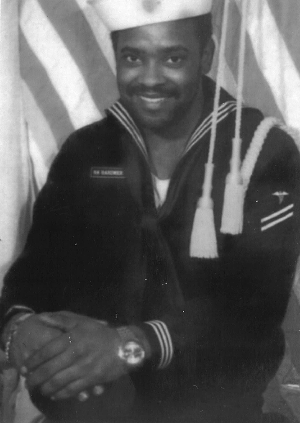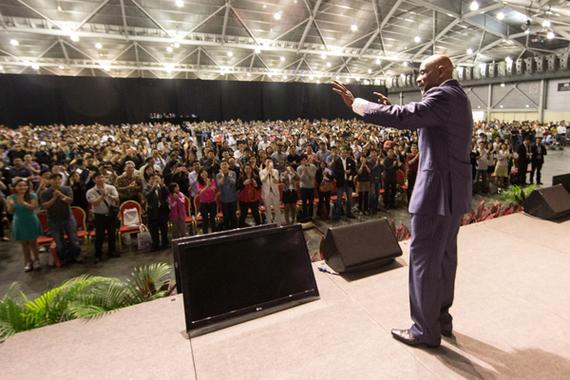Veterans who are homeless may not have a home, but that doesn't mean they don't have diverse skills that could be put to use to meet the needs of an expanding job market. Now is the time for the nation's employers to take a fresh look at hiring homeless veterans for job openings -- and paying these employees a living wage so they can afford safe, stable housing.
Their circumstances are very real to me. Long before I achieved financial success and became the subject of a Hollywood film, I was a veteran, a single father and a working person who was homeless.
Chris Gardner joined the U.S. Navy out of high school and was discharged in 1974. He then moved to San Francisco, where he fell on hard times.
The boarding home where I resided kicked me out after I took custody of my son -- no children allowed. Still, I had to work. At the office during the day, I was surrounded by wealth. In the evening, I struggled to pay for food and housing. On too many nights, I didn't have enough for both. My 14-month-old son and I slept in train stations, hotel lobbies, airports, parks and even public restrooms. I was part of a shadow fraternity: “the working homeless veteran.”
Although I overcame this situation, thousands of veterans remain homeless. Many are working, looking for work or unevenly employed. Many are, like I was, one tough break away from losing their home. For me, child care was another enormous challenge. Leaving my son in the care of another was the hardest thing I had to do.
Too many veterans are poor or near poor and homeless because of it. Census data from 2013 estimated that nearly 1.5 million veterans over the age of 18 reported having incomes below the poverty level.
After a long day on the job, too many such individuals do not retreat to a restful recliner but report back to an often-crowded, hardly private housing shelter. (And let me be clear: A person living in a shelter is a person who is homeless.) In a 2014 survey, mayors in 25 cities reported that, on average, 18 percent of homeless adults were employed.
This is in large part because it's increasingly difficult for segments of the workforce to afford housing. According to a 2015 study by the National Low Income Housing Coalition, veterans earning the federal minimum wage of $7.25 would need to toil in a job (or multiple jobs) for 85 hours a week to be able to swing the cost of a one-bedroom apartment. That's labor but no life. In fact, that same report could cite virtually no county in these great United States where someone working full time and earning the minimum wage could locate an affordable one-bedroom apartment. That's a disgrace.
Finding gainful employment to pay for housing is hard for any veteran experiencing homelessness. It's even more difficult for veterans who've also had encounters with police and stints in jail. Veterans forced to check “yes” on employment applications that ask about past convictions -- no matter if they are for nonviolent crimes directly related to homelessness -- often won't get an interview, even if they qualify for the job.
The good news is that many are working to house and hire veterans exiting homelessness. Government agencies like the U.S. Department of Veterans Affairs and U.S. Department of Housing and Urban Development (HUD) as well as nonprofits, business leaders, the faith community and many others are providing job training and community employment services, housing and other assistance to veterans.
These efforts are paying off in numerous cities with leaders who are responding to the federal government's Mayors Challenge to End Veteran Homelessness and working aggressively on this important issue, including New York and Chicago.
They know, as I do, that achieving an end to veteran homelessness nationwide will require more than thanking veterans for their service, waving flags in their honor and paying lip service to their sacrifice. It will require more landlords to modify their tenant screening criteria to make it possible for formerly homeless veterans and others with potential rental barriers (e.g., spotty credit or lack of a security deposit) to obtain permanent housing. It will require public and private investments in more affordable housing on a community by community basis.
Most of all, it will require more employers willing to hire veterans so they can pursue their “happyness” through the dignity of well-paid work and the stability of home. Haven't they earned it?
Veterans who are homeless or at imminent risk of becoming homeless can call 1-877-4AID-VET to get connected to services.
Through his speaking engagements and media projects, Mr. Gardner aims to help others achieve their full potential and raise awareness about important issues such as homelessness among veterans.
Our 2024 Coverage Needs You
It's Another Trump-Biden Showdown — And We Need Your Help
The Future Of Democracy Is At Stake
Our 2024 Coverage Needs You
Your Loyalty Means The World To Us
As Americans head to the polls in 2024, the very future of our country is at stake. At HuffPost, we believe that a free press is critical to creating well-informed voters. That's why our journalism is free for everyone, even though other newsrooms retreat behind expensive paywalls.
Our journalists will continue to cover the twists and turns during this historic presidential election. With your help, we'll bring you hard-hitting investigations, well-researched analysis and timely takes you can't find elsewhere. Reporting in this current political climate is a responsibility we do not take lightly, and we thank you for your support.
Contribute as little as $2 to keep our news free for all.
Can't afford to donate? Support HuffPost by creating a free account and log in while you read.
The 2024 election is heating up, and women's rights, health care, voting rights, and the very future of democracy are all at stake. Donald Trump will face Joe Biden in the most consequential vote of our time. And HuffPost will be there, covering every twist and turn. America's future hangs in the balance. Would you consider contributing to support our journalism and keep it free for all during this critical season?
HuffPost believes news should be accessible to everyone, regardless of their ability to pay for it. We rely on readers like you to help fund our work. Any contribution you can make — even as little as $2 — goes directly toward supporting the impactful journalism that we will continue to produce this year. Thank you for being part of our story.
Can't afford to donate? Support HuffPost by creating a free account and log in while you read.
It's official: Donald Trump will face Joe Biden this fall in the presidential election. As we face the most consequential presidential election of our time, HuffPost is committed to bringing you up-to-date, accurate news about the 2024 race. While other outlets have retreated behind paywalls, you can trust our news will stay free.
But we can't do it without your help. Reader funding is one of the key ways we support our newsroom. Would you consider making a donation to help fund our news during this critical time? Your contributions are vital to supporting a free press.
Contribute as little as $2 to keep our journalism free and accessible to all.
Can't afford to donate? Support HuffPost by creating a free account and log in while you read.
As Americans head to the polls in 2024, the very future of our country is at stake. At HuffPost, we believe that a free press is critical to creating well-informed voters. That's why our journalism is free for everyone, even though other newsrooms retreat behind expensive paywalls.
Our journalists will continue to cover the twists and turns during this historic presidential election. With your help, we'll bring you hard-hitting investigations, well-researched analysis and timely takes you can't find elsewhere. Reporting in this current political climate is a responsibility we do not take lightly, and we thank you for your support.
Contribute as little as $2 to keep our news free for all.
Can't afford to donate? Support HuffPost by creating a free account and log in while you read.
Dear HuffPost Reader
Thank you for your past contribution to HuffPost. We are sincerely grateful for readers like you who help us ensure that we can keep our journalism free for everyone.
The stakes are high this year, and our 2024 coverage could use continued support. Would you consider becoming a regular HuffPost contributor?
Dear HuffPost Reader
Thank you for your past contribution to HuffPost. We are sincerely grateful for readers like you who help us ensure that we can keep our journalism free for everyone.
The stakes are high this year, and our 2024 coverage could use continued support. If circumstances have changed since you last contributed, we hope you'll consider contributing to HuffPost once more.
Already contributed? Log in to hide these messages.

